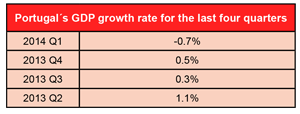Lisbon reborn?
A new era has dawned in Portugal. Following a clean exit from the EU bailout, coupled and three consecutive quarters of GDP growth, a sense of optimism has returned to Lisbon.
The city´s lawyers talk of renewed interest from investment funds, a resurgent M&A market, and the booming economies in Lusophone Africa. Some even predict increases in legal fees. But this optimism is being tempered by a dose of realism. Yes, there were three consecutive quarters of GDP growth in 2013, but there was a decline in GDP in the first quarter of this year. Similarly, while there is a view in some quarters that legal fees could be set to increase slightly, others bemoan the fact that firms – particularly some of the heavyweight practices – are having to dramatically reduce fees in order to bring in work, a trend that could prove damaging to law firms´ businesses in the long term.
There is a firm belief among lawyers in Lisbon that the Portuguese economy is in recovery.
“We have come out of the recession situation, GDP has started to grow and we expect it will continue to grow,” says Duarte Garin, managing partner of Uría Menéndez´s Lisbon office.
He adds that, at the end of last year, the view was that Portugal would not be able to avoid a second EU bailout, “but to actually achieve a clean exit [from the bailout], that was amazing”. He says that his firm´s performance in the first four months of this year has exceeded all expectations. “We have high hopes for privatisations and M&A, while the real estate sector has not been as interesting since 2007 – there´s a lot of interest from private equity” Garin says.
Growth in corporate and capital markets
The higher levels of optimism regarding Portugal´s economic prospects are, in part, being fuelled by increased levels of activity in the debt and equity capital markets. Pedro Siza Vieira, managing partner of Linklaters´ Lisbon office says: “The debt and equity capital markets are very strong – funds, private equity and sovereign wealth funds are now looking into Portugal, the big names are now interested.” Vieira adds that the largest growth areas for his firm were corporate and capital markets. “We´re now at the point we were in 2008 – there will be further opportunities in the coming year and we would expect income to increase,” he says.
Africa provides one of the biggest opportunities for Portuguese law firms, with strong growth expected on the continent during the next 10 to 15 years. “The potential for growth is there in the mining, oil and gas sectors, while investors are also targeting telecoms, retail and financial services – Portuguese law firms want to be seen as local players there and they are using their spare capacity to service Mozambique and Angola,” Vieira says.
Meanwhile, international investors have greater confidence in Portugal with funds from the US, Asia, the UK, Germany and France showing keen interest, particularly in the energy and financial sectors.
Morais Leitão, Galvão Teles, Soares da Silva & Associados managing partner Nuno Galvão Teles, says there are “clearly signs that the economy is improving”. He adds that there has been a recovery in the M&A market, which has grown over the last two years. “This activity is across all sectors, but the energy market is particularly active, as is the financial sector.”
China, in particular, is investing in many different areas of the Portuguese economy. João Caiado Guerreiro, managing partner of Caiado Guerreiro, says: “We are now seeing more corporate work – our corporate M&A team is growing again, whereas, previously we were moving corporate M&A lawyers to labour law. Some Portuguese companies are taking over other weaker companies, while China is investing in all areas of the economy and I expect this to increase.”
Green shoots
The “green shoots” of recovery are also visible in other areas of the Portuguese economy. The growth in private consumption since the last quarter of 2013, together with an increase in the number of business start-ups – and the kick-starting of a number of projects that had been delayed due to the crisis – have created grounds for optimism. AAA Advogados founding partner Dulce Franco says: “The reasons for the increased confidence may be psychological more than anything else, but a more positive outlook always plays an important role in economic recovery – exit from the bailout may also have a positive effect, if people perceive we left the programme on good terms.”
Portugal´s privatisation programme is generating a lot of attention from foreign investors. “It is worth mentioning the efforts of the Government to create better conditions for public and private investment in the Portuguese economy, promote its growth and make financing available,” PLMJ managing partner Manuel Santos Vítor says. “We have to wait and see but these are positive steps.”
Another trend in recent years has been the tendency for Portuguese companies to work on expanding their international operations in order to compensate for declining domestic income. Vítor says: “One of the things we have noticed over recent years was that many of our clients were going through enormous difficulties because of the deterioration in the market’s operating conditions – for many, this situation motivated them to internationalise,” he says. Vítor explains that this trend also accelerated the internationalisation of his firm and led to it taking steps to strengthen its relationships with law firms in Angola, Mozambique, China, Brazil, Cape Verde and Central and Eastern Europe.
Minister says ´no´ to multidisciplinary firms
There has been further good news for some Portuguese lawyers. In a move that has allayed their fears regarding competition from auditing firms, the Portuguese justice minister Paula Teixeira da Cruz – speaking at a meeting of the Associação das Sociedades de Advogados de Portugal in Lisbon this month – said that the creation of multidisciplinary firms of lawyers, auditors and consultants will be “not admissible” under revised rules for the Portuguese Bar. João Vieira de Almeida, managing partner of Vieira de Almeida & Associados says: “Multidisciplinary firms are not a priority. Although I do not think there is an overarching argument against them – and in the long run multidisciplinary firms may eventually be inevitable – I believe the local market is not yet prepared to deal with the related regulatory, and cultural, challenges.”
There is concern among some lawyers in Portugal that the creation of such multidisciplinary organisations would leave law firms at a disadvantage. According to Miguel Teixeira De Abreu, founding partner at Abreu Advogados, it is difficult to put these different services “under the same roof” because different reporting regulations and confidentiality issues makes it troublesome to have them all operating as one entity. He adds: “In addition, law firms in Portugal are taxed under a transparency regime, meaning that they are taxed on undistributed profits. This makes it difficult for them to compete with audit firms, which are taxed as a corporation and thus are not taxed on undistributed profits. The different tax regimes would also leave a law firm being at a disadvantage when competing with a multidisciplinary team of auditors, lawyers and consultants”. According to one Lisbon-based partner, the auditors are in better financial position [due to the tax regime] so it is “not an option for a law firm to go multidisciplinary because you can´t create adequate capital ratios”.
But not all lawyers are opposed to the idea. Vítor says such multidisciplinary firms would represent an opportunity for law firms to “modernise, step up their game and be more professional”. In addition, Vitor says such a development would give law firms the opportunity to incorporate professionals that “complement the provision of legal services”, such as architects, economists, accountants.
Teixeira says he expects to see mergers between smaller firms in the market. He says: “Taken that there are some 700 law firms in Portugal and around 600 of them consist of five partners or less, one should expect some concentration in the future, with smaller firms getting together and gaining more critical mass.”
Unreasonable client demands
According to one partner at a leading corporate and M&A firm in Portugal another problem for some of the biggest firms is they are being forced to slash fees. “Some of the big firms are charging fees that are below dignity,” the partner says. “It´s not good to that, if things change, it will be difficult to put the rates up, because the clients will say, for example, ‘you used to charge me 10, now you want to charge me 100´.” The partner adds that for the low rates some clients want to pay, it is impossible to provide a senior lawyer. “If clients force us to resort to less expensive fees, they won´t get the best lawyers.” The partner says that some of the fees demanded by clients are unreasonable. “This works against them [because they don´t get the best lawyers] and against the legal market – we maintain our rates, our lawyers feel well paid.”
Legal spend in general has diminished in Portugal in recent years. One managing partner says: “Law firms´ turnover declined between 2008 and 2010 – it wiped out margins, and lower fees have created partner tensions, it´s a testing time, you have to make sure every partner knows what they are getting and what they are contributing.”
Yet, despite these challenges, there are encouraging signs for some Portuguese law firms. Garin says there is a high volume of work in the M&A, tax and real estate sectors. “We are reinforcing these practice areas and increasing the number of lawyers we take from law school,” he says. “All firms are doing this.” Garin even predicts a rise in legal fees. “The last three years has had an effect on prices, but demand for legal services is increasing and this should normally produce an adjustment in fees.”













